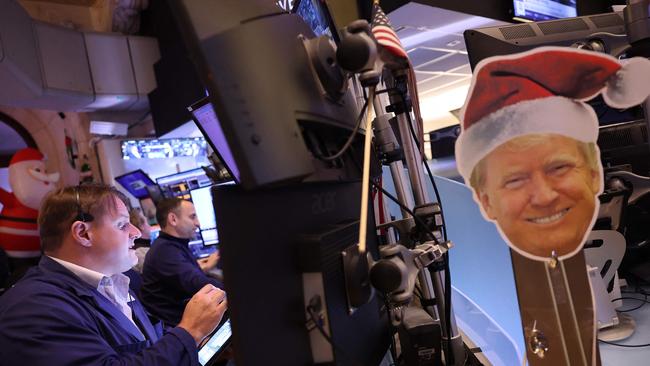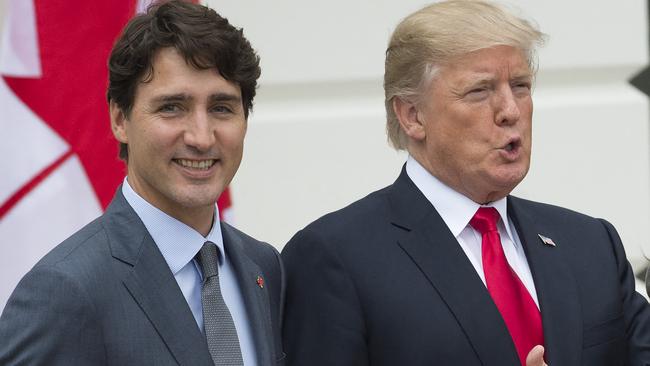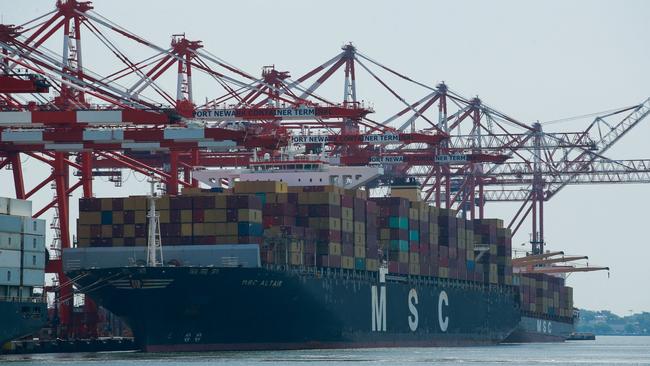
While there have been many attempts to calculate what his threatened tariffs on China will mean for Australia, this week’s announcement about his plans to start his presidency hitting China with 10 per cent tariffs and friendly nations – Canada and Mexico – with 25 per cent tariffs on all imports is a sign that uncertainty will be the norm over the next four years.
The net effect – at least for the foreseeable future – will be lower growth as companies around the world defer big investment calls until they get more certainty.
While there are differing views about what Trump is threatening and what he will actually do, Goldman Sachs’ chief Australian economist Andrew Boak is warning that the impact of Trump’s threats and unpredictable behaviour will be negative for economic growth in Australia.

“There is a lot of uncertainty about Trump’s trade policy, let alone its actual impact,” he says.
He argues that the negative fallout for Australia will come less from any direct impact of the Trump tariffs – whatever they end up being – on trade and more from impact of global uncertainty.
Either way, the uncertainty of a Trump presidency, he argues, will provide a brake on Australia’s economic growth at a time when it is already weak.
Goldman Sachs is estimating that an average 20 per cent rise in US tariffs on imports from China, as well as tariffs on car imports from Mexico and Europe, would slice some 40 basis points off global economic growth.
When it comes to Australia, it halves the negative expectation, to some 20 basis points, on the belief that Chinese policy makers will seek to offset the impact of the tariffs on their local economy with stimulatory policies. But the impact will still be a headwind for the Australian economy.
“You are going to see businesses pull back on investment and employment against the backdrop of US and global trade policy,” Boak told The Australian.
The headwind to growth, he points out, comes at a time when the Australian economy is already very weak, expected to grow at only 1.8 per cent in 2025.
Australia has very little direct exposure to the Canadian and Mexican economies which means whatever tariffs Trump imposes on these countries will have limited direct impact here.
“But even if the tariffs (on Mexico and Canada) are not implemented, the uncertainty from these kinds of announcements is damaging to confidence and to growth and investment decisions,” Boak says.

“Overall, this reinforces our broader view that uncertainty around trade policy will mean a weaker global backdrop compounding the risks of already very weak domestic economic momentum,” he said.
It comes at a time when Australian GDP growth is already at a 32-year low excluding the impact of Covid lockdowns.
Boak says Goldman Sachs’ base case scenario of how the local economy will be affected by Trump’s tariffs has not been changed by recent announcements.
This is partly due to expectations that Trump’s threatened tariffs on goods from Canada and Mexico are unlikely to be implemented in the form announced.
On the other side, expectations are now being baked into forecasts that actual tariffs imposed on goods from China will be higher than the 10 per cent announced this week – potentially up to 20 per cent – but unlikely to reach the threatened 60 per cent.
The other impact of the proposed tariffs being assessed is what it means for inflation.
Boak argues that while the tariffs could be inflationary, inflation is easing back with the real concern for Australia from Trump’s trade policies being the negative impact on economic growth, rather than inflation.
Other commentators have pointed out that while the Australian economy will be harmed by whatever tariffs the US puts on goods from China, the impact will be far less than it might have been a few years ago when China was far more exposed to US market for its exports.
Since the last Trump presidency, China has since diversified its trade away from the US towards other markets including the Southeast Asian region.
Boak argues that the weaker growth impact for Australia as a result of Trump’s actions will allow the Reserve Bank to cut interest rates faster than otherwise- possibly as early as next February.
That could be an unexpected bonus for Australia – but only because our economy will be weakened.
The director of the Australia China Relations Institute at Sydney’s UTS, James Laurenceson, takes a similar view on the uncertainty about what Trump will actually do.
“It’s not clear whether Trump is proposing that on day one, (whether) US tariffs on China will go from their current average level of 20 per cent to 30 per cent, or to 70 per cent from the 60 per cent that he’s previously mooted,” he told the Australian.
He argues that the threat of another “additional” 10 per cent tariff on US imports from China, of itself, won’t have much direct impact on the Australian economy.
But he argues that it will put pressure on Australia’s political relationship with the US.
He argues that it is in Australia’s national interests for Canberra to come out in opposition to Trump’s proposals, particularly when Trump’s threat to put 25 per cent tariffs on imports from Canada and Mexico comes in retaliation for issues unrelated to trade, such as illegal migration and drug trafficking.
“How Trump will react to that is anyone’s guess,” he argues. “But what will be inevitable is that the gap between Canberra and Washington on economic, foreign, and strategic policy, which Foreign Minister Wong and Treasurer Chalmers tell us are increasingly inseparable, will grow.”
Offsetting those concerns is the fact that US sharemarkets have taken off on the news of the Trump election given his deregulatory approach and his “drill, baby drill”, “let her rip” approach to energy and the broader economy.
While that has been good for investors in the short term, the concern is that the implications of Trump’s aggressive and unpredictable behaviour could start to take the shine off the rally as his actions affect business decisions which flow onto Australia as a trade exposed country.
For Australia, which is largely a price taker in the global trade and business world, it will mean continued uncertainty, watching for the fallout from Trump’s policies on our economy with political and business leaders having to navigate their way through a difficult and less unpredictable world.




Donald Trump’s latest threats posted on his social media network, Truth Social, to impose tariffs on China, Mexico and Canada are a stark reminder of the uncertainty ahead for the global economy as he retakes the White House next year.